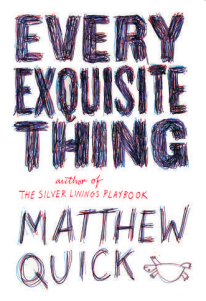 “Just sitting there, enduring the dull, antiquated ritual of a transitional high school graduation, hurts—it feels like there are flames beneath me heating up the metal chair I’m seated on, like my stupid square cardboard hat is full of fire ants, like this whole fucking over-privileged town is slowly grinding away my eye balls with sandpaper. But then I realize that I’m free if I want to be—no one has chained me to this folding chair” (p. 258).
“Just sitting there, enduring the dull, antiquated ritual of a transitional high school graduation, hurts—it feels like there are flames beneath me heating up the metal chair I’m seated on, like my stupid square cardboard hat is full of fire ants, like this whole fucking over-privileged town is slowly grinding away my eye balls with sandpaper. But then I realize that I’m free if I want to be—no one has chained me to this folding chair” (p. 258).
If you’ve ever had days where you feel like no one gets you—family, friends, your entire town—you might be Nanette O’Hare. If you’ve ever had days where it physically makes you itch to sit through “regular life” and not be able to escape it, you might be Nanette O’Hare. If you’ve ever faked your way through anything from a day of school to a relationship with someone “you’re expected to be with,” you might be Nanette O’Hare.
I am Nanette O’Hare.
For more on Matthew Quick’s Every Exquisite Thing, published by Little, Brown Books in May of 2016, continue.
And then one day you will look for you in the mirror and you’ll no longer be able to identify yourself – you’ll only see everyone else. You’ll know that you did what they wanted you to do. You will have assimilated. And you will hate yourself for it, because it will be too late.
Quick’s novel follows Nanette through her last year of high school. She doesn’t seem to fit in, and she relates mostly with Wrigley, the narrator from a novel called The Bubblegum Reaper, which she is given by a teacher. The story that follows details her relationship with her family, a boyfriend, the author of TBR, a young boy she befriends, etc., in addition to her withdrawal from all things “expected of her” and into all things “she wants to become.”
Growing up is difficult. I have never felt fully understood or in the right place at the right time at any point in my life. It doesn’t get any easier, but I don’t find that depressing. This book does a good job of highlighting 1.) how awful it can feel to go through the process of not being “normal like everyone else” (which is a BS concept anyway) and 2.) how we, the different, can still have hope for what’s to come.
To sum up that point, the last page states “…maybe it isn’t the motivating factors that matter so much as simply participating—thrusting your best true, authentic self into the universe with wild abandon. Maybe yielding to our true nature propels us forward into the great unknown, toward targets that we haven’t even dreamed up yet but exist nonetheless” (p 265).
Yes. I’ll keep putting out the best true, authentic self I have into the universe. Someday the great unknown is going to throw back something marvelous. This book does a good job of relating that feeling and, also, of telling a good story through highly relatable characterization. I recommend this YA book to both adults looking for reflection and current young people who feel out of place (everyone!).
Advertisements Share this:




